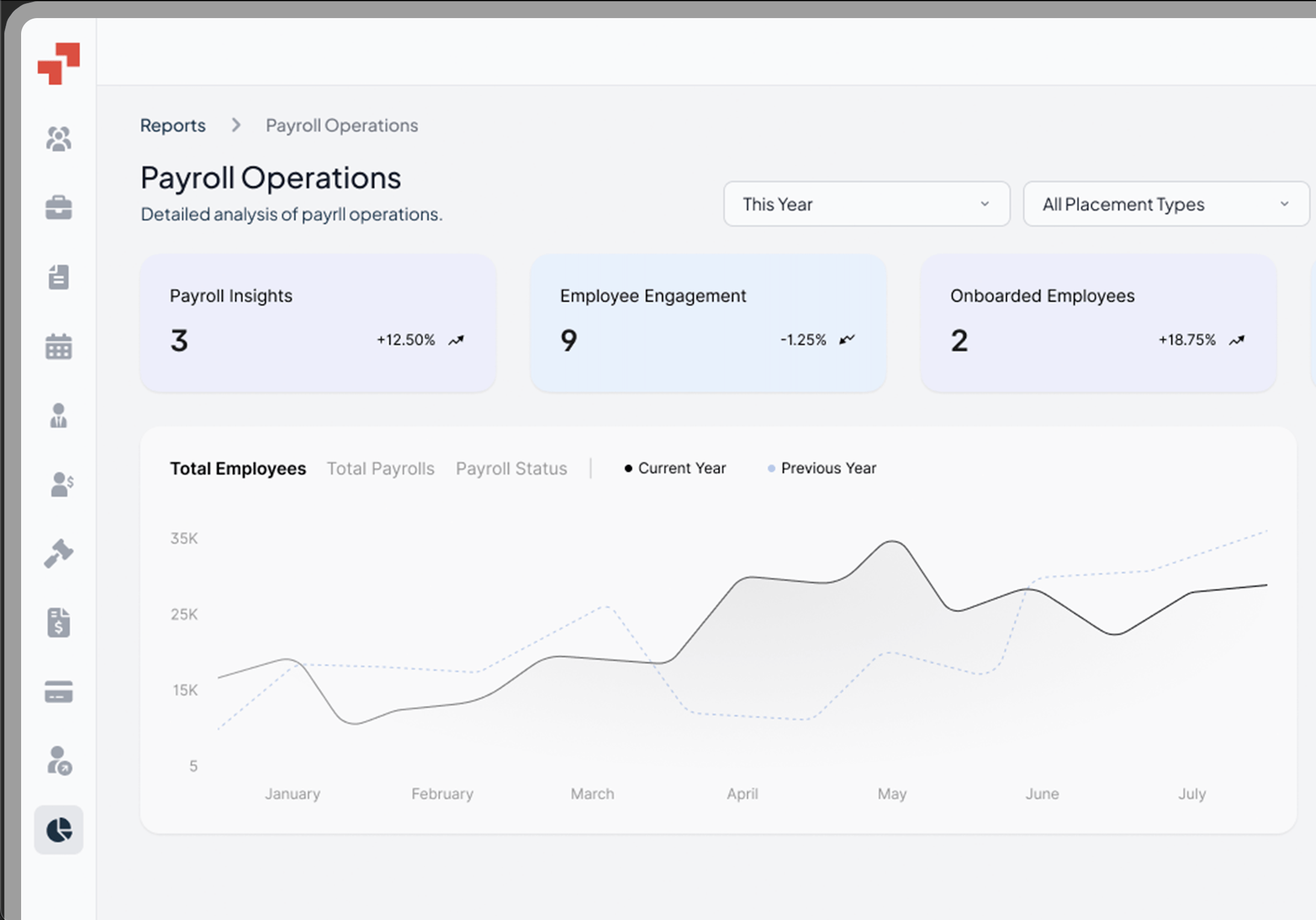Global Workforce GlossaryBack Taxes
Related Terms
Payroll Compliance
FUTA
Tax Identification Number (TIN)
Form 1099-NEC
Employer Identification Number (EIN)
Back taxes refer to tax debt from previous years that an individual or business still owes to the tax authority, such as the Internal Revenue Service (IRS) in the United States. These taxes accumulate due to errors, missed filings, or financial hardship. Ignoring back taxes can lead to penalties, interest, and even wage garnishments, where the IRS levies a taxpayer’s income to collect owed taxes. For globally expanding businesses, understanding back taxes is essential to maintaining international payroll compliance. Proper management of back taxes helps companies avoid legal issues and ensures a clean financial reputation across borders, which is crucial in any tax situation.
Table of Contents
- What is co-employment?
- What are co-employment laws?
- Why is co-employment a risk?
- What are co-employment rules
- Co-employment do’s and don’ts
- How does co-employment work?
- What is the difference between co-employment and joint employment?
- Co-employment vs PEO
- Co-employment vs employee leasing
- Is co-op considered a full-time employee?
- Is it illegal to work for two jobs in the same industry?
- Co-employment examples
- Practical Case Study Example
- PamGro and Co-employment: Your Global Partner
What are Back Taxes?
Back taxes are taxes that remain unpaid after their original due date. They can apply to federal, state, or local levels and may arise from underreporting income, filing mistakes, or failing to submit returns.
Individuals and businesses that owe back taxes also face interest and penalties on the taxes owed until the debt is resolved. If taxpayers do not file a tax return, the failure to file penalty is 0.5% of the amount due.
For global employers, unresolved back taxes can complicate international expansion plans or cross-border employment compliance. Back taxes can be caused by a variety of reasons—from missed payroll withholdings to misclassified international employees. Businesses using Employer of Record (EOR) services like PamGro can minimize the risk of back taxes and other tax issues by ensuring accurate, compliant global payroll processing.
How Do Back Taxes Work?
Back taxes accrue when a taxpayer fails to pay their full tax liability by the due date. The IRS adds interest and penalties on the unpaid amount until it’s fully settled. Over time, this can grow into a significant financial burden. Ongoing interest and penalties continue to accrue on owed taxes until they are paid in full, even during payment plan periods.
The IRS may take enforcement actions, such as issuing tax liens or levying bank accounts, which may lead to attempts to seize assets. A tax lien ensures that the tax authority has first claim over other creditors on a taxpayer’s property. For companies operating internationally, unpaid taxes in one country can impact global reputation and compliance standing. Working with an international payroll and compliance partner ensures taxes are correctly filed, helping prevent costly oversights. Regular audits, accurate reporting, and timely submissions are key to avoiding the accumulation of back taxes.
Where to File Back Taxes
Back taxes should always be filed directly with the IRS or the relevant tax authority in your jurisdiction. For U.S. taxpayers, the IRS provides online resources and mailing addresses for submitting past-due returns. The correct filing location depends on whether you owe individual, business, or payroll taxes.
If you’re an employer managing overseas teams, it’s critical to ensure both local and home-country taxes are properly filed. Using global EOR solutions like PamGro can simplify these processes by managing compliance and filings in multiple jurisdictions.
How to File Back Tax Returns
Filing back tax returns involves gathering all necessary income statements, deductions, and prior-year tax forms. You must complete the correct version of Form 1040 (for individuals) or Form 1120 (for corporations) for each missed year. Once completed, mail the forms to the IRS or file electronically if eligible.
If you cannot afford to pay your full tax bill, consider setting up an IRS payment plan or offer in compromise. This allows you to pay back taxes in manageable payments over time. With a long-term installment agreement, taxpayers can spread payments over months or years, but a setup fee is required.
Taxpayers can request a long-term payment plan to make monthly payments for up to 72 months. Short-term payment plans allow taxpayers to pay in full within 180 days, while long-term installment agreements are available for extended periods. If paying your tax debt would leave you unable to cover basic living expenses, the IRS may temporarily delay collection efforts. Businesses expanding across borders should also coordinate with international payroll specialists to ensure that foreign tax obligations are met, thus avoiding the need to pay penalties for future back-tax scenarios.
How Many Years of Back Taxes Can You File?
Typically, the IRS requires you to file back taxes for the past six years to remain compliant. However, it can request additional years depending on your case’s complexity or signs of fraud. Filing as soon as possible minimizes penalties and interest. Taxpayers should file any unsubmitted returns to avoid further penalties.
If you’re due a refund, note that the IRS only issues refunds for returns filed within three years of the original due date. For international employers, timely filing in each jurisdiction is vital. Delays can affect access to foreign tax credits, payroll reporting accuracy, and overall global compliance. Consulting with tax professionals or EOR providers like PamGro ensures timely, accurate filings across all countries of operation, as well as understanding various payment options .
Does the IRS Forgive Back Taxes?
Yes, the IRS can forgive back taxes under certain programs, such as the Offer in Compromise (OIC) or Fresh Start Initiative. These programs allow taxpayers to settle their debt for less than the full amount owed if they prove financial hardship. To qualify for an Offer in Compromise, taxpayers must meet certain conditions, including having filed all required tax returns. First-Time Abatement (FTA) can apply to certain penalties for taxpayers with a clean compliance record for three prior years.
Eligibility depends on income, expenses, and the ability to pay. Businesses facing severe financial strain can negotiate with the IRS to prevent liens or levies, possibly with the help of a tax attorney. The IRS reviews your ability to pay for an OIC based on income, expenses, and asset equity. For multinational companies, maintaining tax compliance through proper payroll management reduces the risk of ever needing forgiveness, including options like innocent spouse relief. Partnering with EOR providers like PamGro helps maintain compliance and avoid penalty accumulation.
Can Back Taxes Affect Your Credit?
Back taxes themselves don’t appear directly on your credit report. However, if the IRS places a tax lien on your property due to unpaid taxes, that lien can damage your credit score. A tax lien prevents the taxpayer from selling or refinancing assets until the tax liability is satisfied. It signals to lenders that you have unresolved debt with the government.
Even after a lien is removed, the negative impact can linger if not handled properly. For global businesses, unresolved tax obligations can also affect investor confidence and business credit. Timely payments, installment agreements, and EOR-led compliance management help safeguard your financial reputation, social security benefits, and ensure stable creditworthiness, avoiding serious legal consequences.
Back Taxes vs. Backup Withholding — how are they different?
Back taxes and backup withholding are often confused but are distinct. Back taxes refer to unpaid taxes from prior years. Backup withholding occurs when a payer must withhold a fixed percentage (currently 24%) of certain payments because the payee failed to provide a correct Taxpayer Identification Number (TIN).
For example, if an independent contractor doesn’t provide a valid TIN, the payer must withhold backup tax. Businesses hiring internationally should maintain proper documentation for all employees and contractors to avoid such issues. Using PamGro’s global compliance and payroll management solutions ensures correct reporting and helps businesses avoid back taxes and withholding complications.
How Do You Know If You Owe Back Taxes?
You can determine if you owe back taxes by reviewing your past tax returns and checking your IRS account. The IRS sends notices or letters detailing any outstanding tax balances, penalties, or interest. The IRS does not make initial contact by phone or email, but sends an official notice by mail to inform about a balance due. You can contact the IRS directly by phone for questions about back taxes owed.
Businesses can log in to the IRS online account, which provides a comprehensive view of their tax obligations, to see what they owe. International organizations should conduct periodic payroll and tax audits to identify discrepancies early. EOR solutions like PamGro can track local tax obligations and ensure employees’ taxes are filed correctly across borders, preventing the buildup of unpaid tax liabilities.
Who Owes Back Taxes and Who Can File Back Taxes?
Anyone—individuals, small businesses, or large corporations—can owe back taxes if they underpay or fail to file returns. Self-employed professionals, freelancers, or companies managing complex payroll systems are particularly vulnerable to issues with their prior year tax return .
Anyone can file back taxes by submitting missing returns. For global companies, this may also mean reconciling multiple tax jurisdictions. Partnering with a global Employer of Record, even with a potential setup fee, ensures that tax filings for remote teams are compliant and complete, helping employers avoid back taxes in both home and host countries. Staying proactive with compliance audits keeps your organization risk-free.
What Happens When You File Back Taxes?
When you file back taxes, the IRS recalculates your total liability and applies any penalties or interest owed. If you owe taxes, you’ll receive a bill or payment plan options. If you’re owed a refund, it’s credited back to you if within the eligible time frame.
Timely filing can stop further penalties and restore your standing with tax authorities, preventing the initiation of the collection process . For global employers, clearing back taxes demonstrates financial reliability to any government entity —a crucial factor for expansion, partnerships, and payroll operations abroad. EOR providers like PamGro can assist in managing these obligations effectively, keeping businesses compliant worldwide.
What Is an Example of Back Taxes?
Suppose a U.S. startup fails to report $50,000 in contractor payments in 2021. The IRS later discovers this during an audit and issues a notice demanding $12,000 in unpaid taxes plus interest and penalties. These unpaid dues are considered back taxes.
If the startup operates in multiple countries, unresolved back taxes can create global compliance risks. A partner like PamGro ensures accurate reporting and payroll management across borders, helping companies remain compliant in every jurisdiction and avoid such costly mistakes.
Practical Case Study on Back taxes
Imagine a SaaS company based in the U.S. expanding operations into the U.K. and India. During expansion, they discover $40,000 in unpaid back taxes from misclassified international contractors. The IRS begins adding monthly penalties and interest. Meanwhile, incorrect filings abroad put the company at risk of non-compliance in both countries.
The company partners with PamGro for a global compliance audit. PamGro identifies payroll discrepancies, assists in correcting misclassified workers, and coordinates filings with both U.S. and foreign tax authorities. By setting up compliant payroll systems and submitting back tax returns promptly, the business not only avoids further penalties but also restores compliance across all jurisdictions.
This proactive approach prevents future tax liabilities, strengthens investor trust, and ensures smooth global operations—key benefits of working with a global Employer of Record like PamGro.
PamGro: Simplifying Global Hiring & Compliance
Managing back taxes across multiple countries can be challenging, especially for growing companies hiring international talent. PamGro helps businesses navigate global tax compliance through its Employer of Record (EOR) and international payroll services, ensuring accurate reporting on financial accounts . From handling past-due payroll filings to ensuring future compliance, PamGro provides end-to-end support for seamless global expansion.
Whether you’re dealing with back taxes, payroll discrepancies, or cross-border compliance challenges, PamGro ensures your team operates legally and efficiently in every region. Avoid costly tax penalties and maintain full compliance with global labor laws through a single trusted partner.
🌍 Learn more about how PamGro simplifies global payroll compliance and prevents back-tax risks for international employers.
Hire the Best Talent, Anywhere






